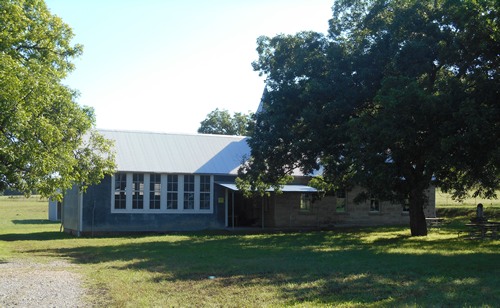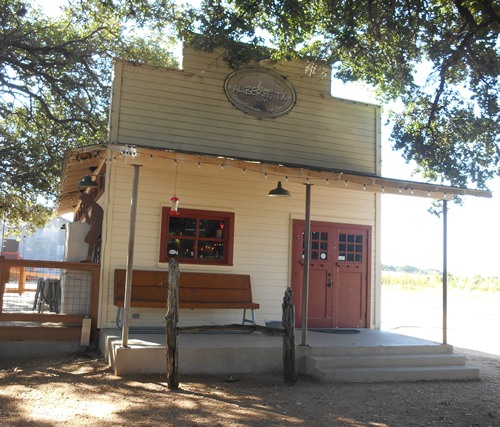Books by
Michael Barr
Order Here: |
|
|
A
hot summer day in the Texas
Hill Country can give Lucifer a heat rash, but in Albert,
where the beer is cold, the music is lively and a gentle breeze
stirs the air under the giant oak trees behind the Albert icehouse,
even a sultry Texas afternoon can be downright pleasant.
|
Albert Dance
Hall Sign
Photo courtesy Michael
Barr,
June 2019 |
Albert is a
small community quietly hidden in the hills between Stonewall
and Blanco.
Settlers first came to the area in the 1870s looking for land to graze
livestock. Beyond that the early history of Albert is a little fuzzy.
For a time the community was a stop on the stage route between Fredericksburg
and Blanco.
Here the stagecoach drivers changed horses and dropped off the mail
at Ben George's house.
But Ben George got into some kind of legal trouble, jumped bail and
skipped the country. His bondsman, Fritz Wilke Sr., forfeited the
bond money but took over as custodian of the stage stop.
Wilke, a blacksmith from Fredericksburg,
earlier bought land along Williams Creek from a bachelor named Elmeier
who was murdered in a shootout with a man named Spitzer who was trying
to steal the money from the land sale.
While the folks who lived along Williams Creek were not above an occasional
misdemeanor, that murder, as far as anyone can remember, is the only
serious crime committed in these parts in the last 150 years.
The place still didn't have a name, but when B. Martin became postmaster,
people called it Martinsburg. Martin ran the post office from 1877
to 1886 when the Postal Service rerouted the mail through Hye
5 miles to the north.
Meanwhile 15 miles to the west, Minnie Luckenbach opened a store and
a saloon on South Grape Creek. That's when the connection between
the towns of Albert
and Luckenbach
began.
The post office on South Grape Creek closed for a time and then reopened
in 1886 under the name Luckenbach.
One story says Minnie pulled some strings and had the post office
named after her husband Albert Luckenbach.
A few years later Minnie and Albert sold the business in Luckenbach
and moved to Martinsburg, just as the town got a new post office.
When the Postal Service named the new post office Albert instead of
Martinsburg, quite a few people were certain Minnie had a hand in
it.
That, some say, is how Albert Luckenbach came to have 2 towns named
after him. |
 |
|
Otto
Schumann built the first store in Albert
in 1897.
Citizens of Albert built the first school one mile above town on
Williams Creek. The school building that stands today just behind
the dance hall dates to 1900. Future President Lyndon Johnson attended
school there briefly in the early 20th century.
Max Beckman built the dance hall in the 1920s, The cavernous, tin-covered,
wood-beamed building with side flaps for ventilation was the community
weekend gathering spot. The hall hosted regional German brass bands
that made the rounds among the dance halls at Albert,
Hye, Luckenbach,
Grapetown,
Cain City and Fredericksburg.
The Germans have always had a gift for organizing community events.
In the early 20th century Gustav Wilke directed a singing society
called the Albert Echo. In the 1940s Albert hosted the Gillespie
County Singing Festival.
Then in the 1930s, the population of Albert began a slow decline.
The school consolidated with Stonewall. The dance hall went silent.
Some of the tin came loose and flapped in the breeze. The rafters
sagged, and the corners started to lean.
|
 |
The old store,
said to have the coldest beer around, closed in the 1980s.
But Albert wasn't down for long. New owners bought the place on eBay,
made repairs and gave the dance hall a facelift. It never looked better.
Today a popular icehouse stands where the store once stood - icehouse
being the name given to stores that once sold ice as well as groceries
and beer.
Albert is a nice break from the wine tour. Nothing wrong with wine,
but some of us still like to swig a Shiner under the trees. |
|
© Michael
Barr
"Hindsights"
July
1,
2019 Column
Sources:
"Search For Fertile Grasslands Led First Settlers to Albert Community,"
Fredericksburg Standard, May 1, 1946.
"Owner puts small historic town back on market for $3.5 million,"
Kerrville Daily Times, June 18, 2007. The Handbook of
Texas.
|
|
|
